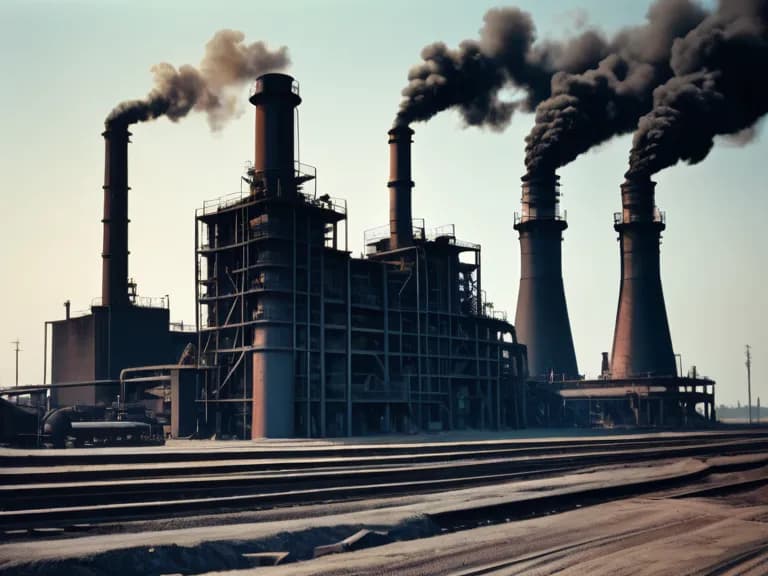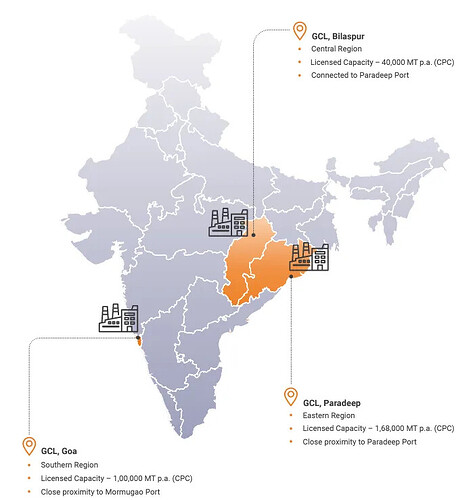History
Established in 1967, Goa Carbon is one of the leading CPC manufacturers in India and was the first Indian manufacturer and exporter of CPC. With more than 5 decades of experience in this industry, GCL has an established market position in the CPC market.
GCL is part of the Dempo Group — which has construction, publishing, shipbuilding, travel, and trade among others. So, there’s a very strong holding company backing Goa Carbon.
Manufacturing facilities
Goa Carbon has 3 manufacturing facilities strategically located near major ports in Goa, Paradeep, and Bilaspur with a combined capacity of 3,08,000 MTPA (metric ton per annum).
All the plants are ISO 9001 and ISO 14001 certified by Bureau Veritas, reflecting the company’s commitment to quality and environmental standards.
The Business
- Goa Carbon Limited is in the business of manufacturing and marketing Calcined Petroleum Coke (CPC) — an essential ingredient in aluminum smelting.
What is Calcined Petroleum Coke?
Calcined Petroleum Coke (CPC) — is very important in the manufacturing process of aluminum, steel & other carbon-based products.
-
CPC is an essential raw material for making the anodes that are required for aluminum smelting. About 400 KG of CPC is required to produce 1 ton (1,000 KG) of aluminum. 1. CPC is an essential raw material for making the anodes that are required for aluminum smelting. About 400 KG of CPC is required to produce 1 ton (1,000 KG) of aluminum.
-
Raw Petroleum Coke (RPC) or Green Petroleum Coke (GPC) (which is a by-product of oil refining) is the raw material used to produce CPC. The process of calcining removes moisture and volatile matter from RPC at high temperatures (around 1,350 degrees) to produce CPC.
-
There are no commercially viable substitutes for CPC in aluminum smelting due to its low impurity levels, relatively low cost & ready availability. Additionally, CPC plays a significant role in the production of titanium dioxide — which is used as a base pigment for construction, automotive paints, plastics, coatings, cosmetics, toothpaste & sunscreen. CPC is also utilized in the production of high-strength steel for building bridges/skyscrapers etc.
-
China + North America are the dominant producers of CPC, accounting for >75% of global CPC production. Demand for CPC is directly linked to the demand for aluminum and steel
Key Strength
- Long-term relationships with customers/suppliers — Since Goa Carbon has been in business for >50+ years, it has developed excellent relationships with its customers & suppliers [which is NECESSARY in a commodity business].
In a commodity business, customers buy from the player that sells a product (of the same quality) at a lower cost. The only reason they might pay higher is if you offer a better credit period OR if they have a great business relationship with you.
-
Domestic customers include Hindalco, NALCO, Vedanta Aluminum, Kerala Minerals, SAIL, and several steel plants in the Southwestern region and Odisha.
-
International customers include Aluminium Pechiney (France), Aluminium of Greece, SABIC (Saudi Arabia), Dubai Aluminium, Sohar Aluminium (Oman), and ALUCAM (Cameroon).
-
GCL has developed healthy relationships with various global raw material suppliers such as Kuwait Petroleum, Oxbow Carbon & Minerals, Mitsubishi Corporation etc.
-
Growth in Aluminium demand to spur growth in CPC demand — India’s aluminum market was valued at $11.28B in 2023 and is predicted to reach $19.76B by 2030 growing at a CAGR of 7.6%.
Aluminum’s lightweight nature contributes to fuel efficiency, making it an efficient choice for automotive, defense & aviation industries.
-
The Government’s massive infrastructure development plans, growing urbanization, investment in railways/metro lines, transition to clean energy, and EVs are likely to increase aluminum demand in India. As per ICRA, the automotive sector plays a pivotal role in the overall consumption of aluminum in India.
-
Rising costs of aluminum production in the West could shift production towards the East, which could result in additional business opportunities for the Company.
-
The Supreme Court of India has put a cap on import of CPC by aluminum smelters at 0.50 million tonnes per annum which means that additional supply of CPC has to be met from domestic supplies — thereby benefitting GCL.
-
The company recently launched its first branded product called ‘Gcarb+’ to revolutionize the recarburizer and carbon additive sector. Targeted primarily at steel/foundry industries — the introduction of Gcarb+ signifies the company’s dedication to innovation and its vision to offer holistic carbon solutions beyond CPC supply.
-
Promoter holding has remained at approx. 60% with no considerable change in the last 5 years — which means that the promoters are not looking to cash out even though the stock price has increased. Also, no shares held by promoters have been pledged, which is a good sign.
Key Weakness
- Commodity business — Calcined Petroleum Coke is a commodity, which is used in the production of aluminum — which is another commodity. There is not going to be much difference between the CPC that Goa Carbon makes and the CPC that a competitor makes.
Commodity businesses in general do not have a lot of pricing power. Low pricing power > low operating margins. Low margins > Low profits. Low profits > Low growth in shareholder wealth.
In the commodity business — it comes down to operational leverage to reduce prices continuously, run your factories at optimum capacity, and maintain a healthy relationship with the customer.
-
Raw Petroleum Coke (RPC) is the raw material used to make CPC. RPC is derived from crude oil. An increase in the prices of crude oil could increase the cost of procuring RPC and have a direct impact on the margins of Goa Carbon.
-
As per the management, customers are very specific about the quality parameters of CPC which puts a lot of pressure on procuring high-quality RPC. A slight change in quality parameters has a significant impact on the pricing of RPC + the quality of RPC in the domestic market has been deteriorating causing dependence on imported RPC — which would lead to an increase in the cost of RPC.
-
Demand for CPC is dependent on demand for aluminum/steel which is dependent on the pace of growth of the domestic/global economy. Any slowdown in economic activity — would adversely impact Goa Carbon.
-
Idle manufacturing capacity — GCL has 3 manufacturing facilities, but they’re not operating at 100% capacity. As per an analyst report, the capacity utilization was 64% in FY21, 59% in FY22 & 55% in 9MFY23.
It takes a lot of money to build factories. Once they’re built — you want them operating at nearly 100% capacity to recover your money back ASAP. Capacity utilization levels going down means that your machines/factory is lying idle for a significant time and that’s not something you want to see as an investor.
The question is — is the capacity utilization level low because of low demand? Or is there some issue with the machines? And if it’s a demand issue, can GCL increase capacity to cater to more demand?
-
Environmental Regulations could hinder business — Aluminium/steel production releases a lot of harmful emissions which hurts the environment. Any potential regulation that impacts either the import or production of aluminum could have an adverse impact on the production + demand for CPC.
-
High customer concentration — The majority of GCL’s revenues come from Hindalco Industries (HIL) and Vedanta Aluminium & Power Limited (VAPL). Any slowdown in the businesses of these two companies would directly impact GCL.
-
High Debt to Equity ratio — GCL’s D/E ratio is quite high given the requirement to raise short-term loans (including overdraft limits) due to fluctuations in raw material prices.
However, it has reduced its borrowings from INR 422 Cr in FY23 to INR 334 Cr in FY24, which is a good sign.
Conclusion
- Demand for aluminum/steel is going to be on an upward trend given the massive infrastructure spending that India is embarking on — which means more requirements of CPC, which bodes well for companies like GCL.
DISC: Invested in stock. Views are biased



